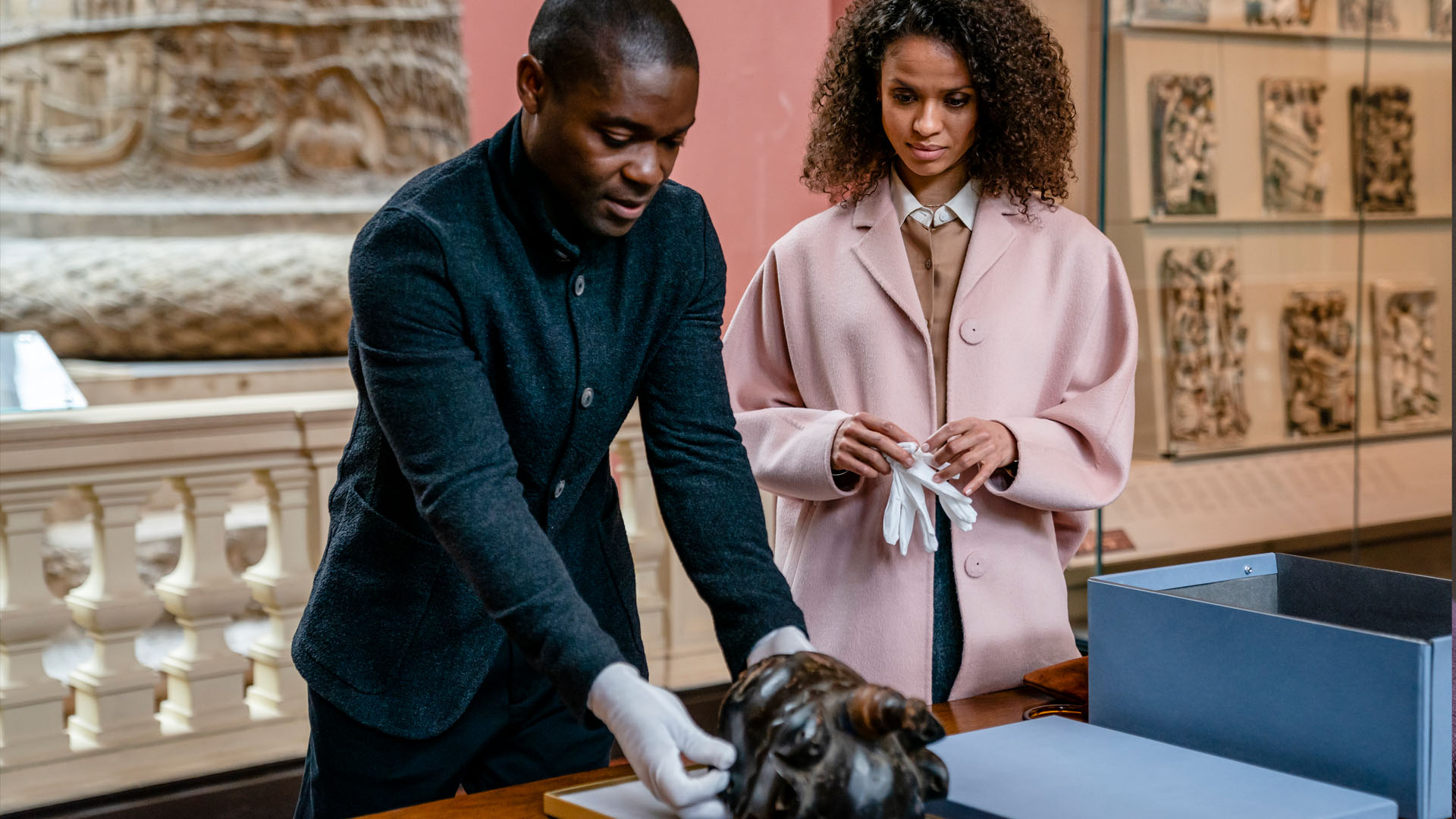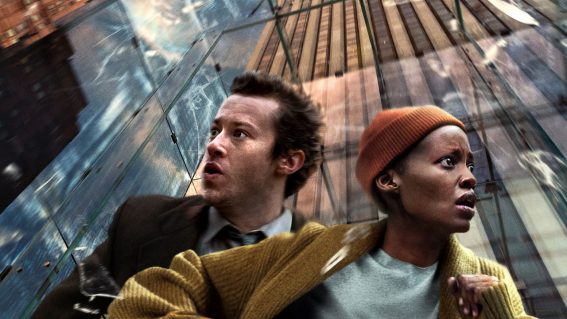The Girl Before houses a chilling, controlling, data-mining Generation Rent thriller

Gugu Mbatha-Raw and Jessica Plummer are young women with chillingly atypical tenancy agreements in thriller limited series The Girl Before – stream it on Neon from February 13. The show evokes a claustrophobia that is genuinely unnerving, writes Katie Parker.
POV: You’re a renter on the hunt for a house in 2022. You’ve looked at the usual slew of properties: affordable but yuck. Not affordable but still kind of yuck. Yuck, but this time with no whiteware included. Then you come across something extraordinary—a beautiful, ultra modern inner city abode that sits squarely in your price range.
“The owner sets an affordable rent”, a letting agent explains in The Girl Before’s first episode, “to people who live here the way he intended”.
The London townhouse he’s talking about sits at the centre of The Girl Before. Chilly and grey and immaculately photo ready, it’s the kind of house that anyone who has lived in a rotting, mouldy, uninsulated flat would barely dare to dream of—and, when we discover it, it is through the eyes of the two women who have themselves never inhabited such a space.
Emma (Jessica Plummer), a young marketing professional for a water cooler company, is one of these prospective tenants, exploring the house with her boyfriend Simon. The other is Jane (Gugu Mbatha-Raw), a single woman looking for a fresh start after the devastating loss of her pregnancy. The ladies appear to be unrelated, yet bear a striking resemblance (surely just a coincidence?).
Examining 1 Folgate Street, both are besotted. More like a museum than a house, the spare, minimalist space comes with a strict set of rules—over 200 in fact, of the kind which, if listed on TradeMe, would instantly be turned into yet another article exposing the audacity of the bottom-feeding landlord class.
Nevertheless, Jane and Emma hear them out : no pictures, no drink coasters, no ornaments, no knick knacks, no carpets or rugs, no magazines, no books. “No children”, the agent tells Jane airily, “obviously”. Regular inspections ensure that no rules are being infringed upon… if they are, well, we hope you enjoyed your stay.
What’s more, there are no switches or on/off buttons, or even keys. Everything in the house is automatic, from the shower to the stove, while the house’s uncannily ubiquitous internal programme ‘Housekeeper’ is in charge of picking your music and arranging your life.

So what’s the catch in this tech-savvy dream house (other than the bizarre and creepy restrictions imposed on the minutiae of one’s everyday life)? Data gathering… and lots of it. This, of course, is sold as yet another luxury—the better the house knows you, the better it can cater to your needs right?
It’s a tough sell, but both Emma and Jane are captivated and forge ahead with the intrusive acceptance process—one which concludes with an interview with the architect and owner himself, the enigmatic Edward Monkford (Selma’s David Oyelowo).
Surely both can’t land the property, but they do. Finally it becomes apparent that these two identical scenarios took place in different timelines, three years apart—and that there is something very wrong with the fact that these two incredibly similar looking women were awarded an opportunity so many were not. Particularly given, as Jane discovers, that the house is where Emma died under mysterious circumstances.
It is this question—what connects Jane and Emma?—that drives The Girl Before and, as the two timelines collide, it becomes increasingly clear that it’s more than just their taste in architecture.
Adapted from the best selling 2016 novel by J.P. Delaney (who also co-wrote and created this series), like so many entries to the increasingly overstuffed category of ‘British Mystery Thrillers’, The Girl Before deals in relatively recognisable terms: a dead girl, a mysterious ex, a web of secrets and a horrible, horrible crime. Yet it also has more on its mind than mere titillation, and departs from these tropes to tell a story that is both deeper and more compelling than your typical Harlan Coben Netflix whodunnit.

Told with quick breathless pace and sustained momentum over an appropriately minimalist four episodes, The Girl Before is mercifully free of the usual fluffy fillers that often inhabit similar shows. With no extraneous characters, tedious red herrings, or (my favourite) any interest in the personal lives of the ineffectual cops who occasionally show up to investigate, it’s your usual thriller stripped bare. Contained almost entirely within the walls of the women’s oppressive home, the show evokes a claustrophobia that is genuinely unnerving.
Instead of getting lost in distractions, The Girl Before exhibits the kind of laser focus on its core themes that is highly unusual in traditional crime dramas—particularly given that those themes find the show wading into the murky waters of trauma, abuse and a culture that only wants to acknowledge such things in the most cynical of terms. Both Emma and Jane have experienced things that polite society would rather not think about—unless, that is, that doing so works in someone’s favour.
That their response to this is to be drawn in by a house (and a man, as Edward has a penchant for getting cozy with his tenants) that monitors and controls their every move, is then not something that The Girl Before treats as mere fodder – and the collection of data is part and parcel with this.
For both women, part of the deal of living in the house is that they must, when asked, answer a series of questions, delivered by the AI housekeeper. This, of course, is something they have agreed to—but who really wants to decide whether “A carefully considered gesture of affection is more romantic than a spontaneous one” when they’re running late for work?

Though unconventional, the living situation that the women agree to is explained away with almost laughable ease. It is, of course, nothing that Google or Facebook aren’t already doing, Edward tells Jane. “I don’t think Facebook follows me into the shower” she demurs. Yet she, like Emma accepts the terms.
It’s an unsettling compromise, all the more so because she’s right—for the right price, would this really give many of us pause? The decision to do this, along with the lived experience of making this kind of deal, looms large over he Girl Before. Like Jane and Emma, throughout the show these same prompts are given directly to the viewer—interspersed between scenes and issued with confronting directness:
“In any situation, there is a correct course of action”
“I get upset when things don’t go as planned”
“Other people always let me down in the end”
Your only options are agree, or disagree—but underneath lies something more muddled and unsettling, raising questions that cannot and should not be answered with such ease. How much of ourselves are we willing to give up for the lifestyle we want? The home that makes us feel safe and in control? The illusion that, even just temporarily, we live the life we once thought we deserved?
The Girl Before asks these questions with eerie clarity, as it carefully and plainly unravels its central mystery. Edward, the strange yet alluring landlord, draws his tenants in with practiced charm, and Oyelowo is chilling, as the wealthy, elite benefactor allowing these lowly folk a stay in his palace.
A rare thriller that is thoughtful as well as enthralling, the philosophical bent of The Girl Before does not dilute its entertainment value. As a mystery it is eerie and compelling, and with thankfully little padding, an ideal binge watch.
With an excellent cast all round—both Plummer and Mbatha-Raw are each other’s perfect foil as they share the starring credit – The Girl Before is an unusually direct, to the point production. Concerned with both the red flags we notice and the ones that we don’t, here it is the grey area between them that counts—and that which makes it such an unpredictable, enjoyable experience.













